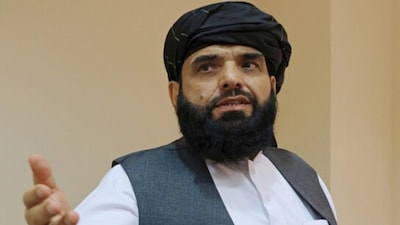Summarized by AI.

Share Your Feedback
In a significant signal of intent, senior Taliban spokesperson Suhail Shaheen has said that the Afghan government is ready to “go all out” to rebuild and strengthen relations with India. His remarks came while speaking exclusively to CNN-News18, soon after the meeting between India’s External Affairs Minister S Jaishankar and Afghanistan’s acting Foreign Minister Amir Khan Muttaqi, which both sides described as cordial and forward-looking.
“We will go all out to strengthen relations with India,” Shaheen said in the exclusive interview with CNN-News18. “The people of Afghanistan and India have traditional relations throughout history. There was a need to resume that normal and good relation they had throughout the ages. I expect this meeting was a start point of a new phase of relation between the two countries.”
He added that this new engagement should lead to concrete outcomes through structured dialogue. “After this, there should be a committee to explore various areas of cooperation and strengthening relations,” he said.
A Shared Regional Interest
Shaheen underlined that India and Afghanistan are “regional partners with shared interests” in security, trade, and connectivity. He emphasised that India’s past developmental role in Afghanistan, including infrastructure and capacity-building projects, must continue.
“There are opportunities in Afghanistan, particularly for investment,” he said. “There were projects which India was working to complete but still remain incomplete. These need to be resumed. As regional countries, we share an interest in regional security, promoting trade and commerce, and other areas of cooperation. I hope this visit will give impetus to all these areas.”
‘Full Security Guaranteed’ to Indian Mission and Projects
Addressing India’s foremost concern — the safety of its diplomatic personnel and workers — Shaheen assured that the Taliban administration would provide “full security” to Indian officials, projects, and investments.
“We guarantee full security,” Shaheen said. “If you come here, the security prevalent in Afghanistan is better than before. We will provide full security to your projects and to your mission in Kabul.”
When asked about the threat from groups such as Lashkar-e-Taiba, Jaish-e-Mohammad, and ISKP, Shaheen downplayed their presence, insisting that Afghanistan was now far more stable.
“Yesterday there was no attack by ISIS,” he clarified. “There was an explosion, but it is still under investigation. There is no physical presence of ISIS in Afghanistan now. Maybe some individuals come from other countries, but they are not organized. Anyone can travel from one province to another day and night — this is not possible in some other countries. The security is better now.”
He also extended an open invitation to international media to assess the situation independently:
“I think journalists should come to Afghanistan and see the security with their own eyes. I invite journalists.”
India’s Access to Afghanistan: ‘We Will Explore All Routes’
With Pakistan unlikely to allow land access and Iran’s Chabahar Port under sanctions, connectivity remains a major challenge for India. On this, Shaheen said the Taliban is ready to work with New Delhi to find practical solutions.
“When we start relations, we will explore all possible routes between the two countries,” he said. “Of course, we can have several alternative options, and that will be discussed between the two countries. We will choose the best one.”
A New Beginning
Suhail Shaheen’s remarks suggest a deliberate outreach from Kabul, positioning the Taliban as open to constructive engagement with India. His repeated assurances of security and investment opportunities indicate an effort to rebuild confidence after years of strained ties.
As Shaheen put it, “We will go all out” — a statement that captures both the ambition and the urgency of this renewed diplomatic push between New Delhi and Kabul, potentially laying the groundwork for a new chapter in India-Afghanistan relations.





